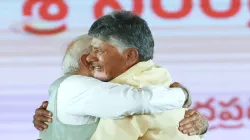TDP-BJP: From NTR-Advani era to Modi-Naidu bonhomie, a look at ups and downs of alliance
The BJP-TDP alliance has undergone some ups and downs over a period of time. As both parties formed government in Andhra Pradesh in the 2024 Assembly elections, a look at the history of both outfits in the past decades.

The Telugu Desam Party (TDP), the Bharatiya Janata Party (BJP) and the Jana Sena Party (JSP) formed the National Democratic Alliance (NDA) government in Andhra Pradesh in which N Chandrababu Naidu was sworn in as the Chief Minister for the fourth time on Wednesday (June 12). The history of the BJP-TDP alliance dates back to decades when Nandamuri Taraka Rama Rao (NTR) was at the helm of the TDP in 1985. Today, the TDP is among the kingmakers in the NDA government at the Centre led by Prime Minister Narendra Modi. As the BJP fell short of a majority in the Lok Sabha Elections 2024, the NDA allies, including Nitish Kumar-led Janata Dal-United (JDU) and Naidu-led TDP, propelled the BJP to form the government with the support of its partners.
The TDP, which won a majority in the Andhra Pradesh Assembly elections in 2024 and returned to power along with its allies, was founded in 1982 aiming to provide an alternative to Congress and emphasise Telugu regional pride. The BJP-TDP alliance has had its own dynamics and test of time.
First alliance partners of TDP
One of the first alliance partners of the TDP came in its first election in 1983 in which the party joined hands with Sanjay Vichar Manch, led by Maneka Gandhi. The TDP secured 201 Assembly seats, after which NTR became the Chief Minister. He expressed willingness to accommodate all anti-Congress parties in the alliance. It was this time when an alliance with the BJP and Left parties failed to take shape as the NTR refused to agree to as many seats as were sought by the parties.
In the 1985 elections, the TDP forged an alliance with the BJP, and secured 202 seats on its own to return to power. The tie-up continued also in the 1989 elections. However, the TDP-BJP-Left alliance failed to give the same result as the last time as Congress stormed back to power.
In 1994, the TDP contested with CPI and CPI-M and secured 216 on its own, propelling NTR to take over the reigns as the Chief Minister for the third time. However, due to an infighting within the TDP in 1995, NTR's son-in-law Nara Chandrababu Naidu assumed the charge of the Chief Minister. NTR confronted a revolt within his own party after which most MLAs backed Naidu.
BJP-TDP pre-poll alliance
In 1998, the BJP-led NDA emerged as the single largest bloc but failed to reach the majority mark in the Lok Sabha. The TDP decided to back the Atal Bihari Vajpayee-led government and party leader Ganti Mohana Chandra Balayogi became the Lok Sabha Speaker. Vajpayee lost the majority in 1999 after AIADMK chief Jayalalithaa withdrew its support and the NDA government collapsed by just 1 vote (270-269). In 1999, the BJP and the TDP contested the Lok Sabha and Assembly polls together in Andhra Pradesh. The TDP won 180 seats on its own while the BJP won 12 in the Andhra Pradesh Assembly. Naidu became the Chief Minister for the second time. In the 1999 Lok Sabha polls, the TDP-BJP combine won 36 out of 42 seats. The TDP won 29 and the BJP 7 seats. The TDP extended outside support to the Atal Bihari Vajpayee government in 1999 at the Centre. However, the government failed to return in 2004.
In 2004, both parties fought the Lok Sabha and Assembly Elections together again but lost to Congress in the polls. In 2009, both parties did not forge an alliance and contested on their own. Congress formed its government in Andhra Pradesh. In 2014, the TDP and the BJP once again came together and formed the alliance for both the Lok Sabha and Assembly elections. The TDP won 16 seats in the Lok Sabha and 102 seats in the Assembly. Naidu was elected as the Chief Minister for the third time in the state.
However, Naidu walked out of the NDA government just before the 2019 Lok Sabha elections. He joined the NDA once again ahead of the 2024 general elections and won 16 seats, therefore becoming the kingmaker in the Modi 3.0 regime. The BJP won three seats including Anakapalle, Narsapuram and Rajahmundry. The Pawan Kalyan-led Jana Sena Party (JSP), which played a crucial role in the alliance, won two seats of Kakinada and Machilipatnam. In the state polls, the TDP won 135 seats while the JSP and the BJP won 21 and 8 seats respectively.
On June 12, PM Modi attended the swearing-in ceremony of Chandrababu Naidu.
ALSO READ | PM Modi shares warm moment with Chiranjeevi, Pawan Kalyan at Naidu's oath-taking ceremony | WATCH
